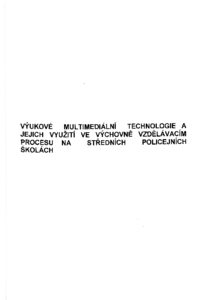Výukové multimediální technologie a jejich využití ve výchovně-vzdělávacím procesu na středních policejních školách
Educational multimedia technologies and their use in the educational process in secondary police schools
rigorózní práce (UZNÁNO)

Trvalý odkaz
http://hdl.handle.net/20.500.11956/18215Identifikátory
SIS: 149655
Katalog UK: 990018474960106986
Kolekce
- Kvalifikační práce [20521]
Autor
Fakulta / součást
Pedagogická fakulta
Obor
Učitelství všeobecně vzdělávacích předmětů pro základní školy a střední školy - informační a komunikační technologie
Katedra / ústav / klinika
Katedra informačních technologií a technické výchovy
Datum obhajoby
9. 9. 2008
Nakladatel
Univerzita Karlova, Pedagogická fakultaJazyk
Čeština
Známka
Uznáno
Modern teaching in terms of creative work based on information used in mutual interaction between teachers and students requires intensive searching, finding and introducing rational forms, methods and didactic procedures and their implementation at schools. The process also requires creating adequate pedagogical environment. Andragogy and lifelong learning are priorities not only of the state education policy but also in training police officers and civilian employees within the Ministry of Interior. The high level of output experience and creation of the attitudes of the trainees are the backbone of the upcoming reform of the education program of the professional training of the police novices focused on professional and competent service. Learning for life, declared in materials of international institutions to be the essentials of the 21st century information society, brought into practice by means of behavioural, cognitive and, above all, constructive concept of training and education requires intensive work aimed at changing the existing paradigms of instructive execution of formal and informal education in accordance with Comenius' idea that " pupils should enjoy learning, being encouraged by their parents, school and the method." Powered by TCPDF (www.tcpdf.org)
Modern teaching in terms of creative work based on information used in mutual interaction between teachers and students requires intensive searching, finding and introducing rational forms, methods and didactic procedures and their implementation at schools. The process also requires creating adequate pedagogical environment. Andragogy and lifelong learning are priorities not only of the state education policy but also in training police officers and civilian employees within the Ministry of Interior. The high level of output experience and creation of the attitudes of the trainees are the backbone of the upcoming reform of the education program of the professional training of the police novices focused on professional and competent service. Learning for life, declared in materials of international institutions to be the essentials of the 21st century information society, brought into practice by means of behavioural, cognitive and, above all, constructive concept of training and education requires intensive work aimed at changing the existing paradigms of instructive execution of formal and informal education in accordance with Comenius' idea that " pupils should enjoy learning, being encouraged by their parents, school and the method." Powered by TCPDF (www.tcpdf.org)
